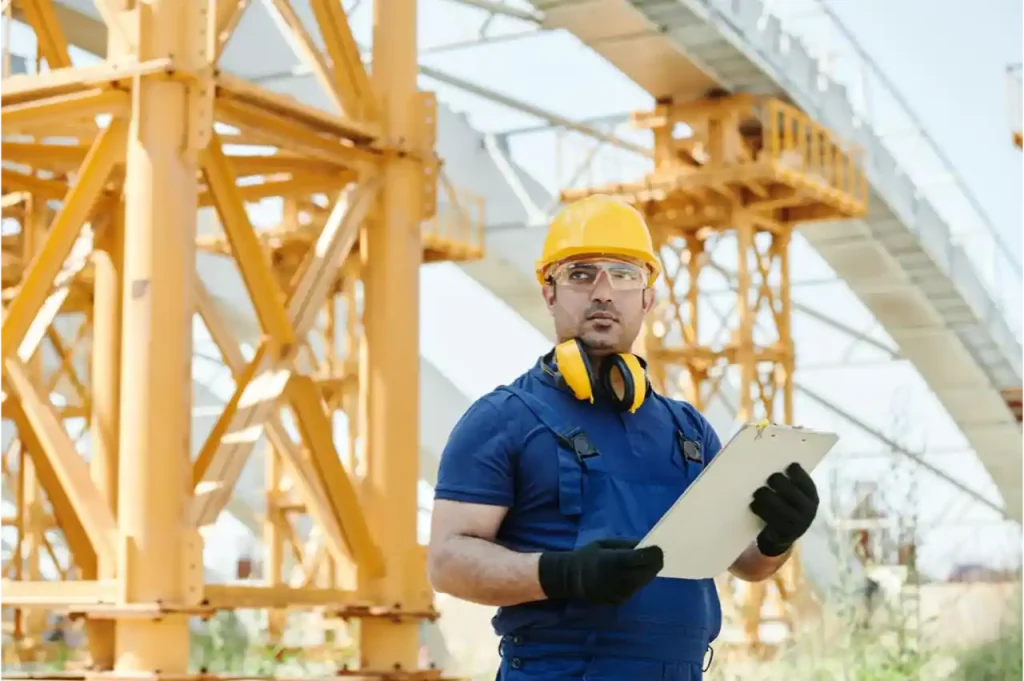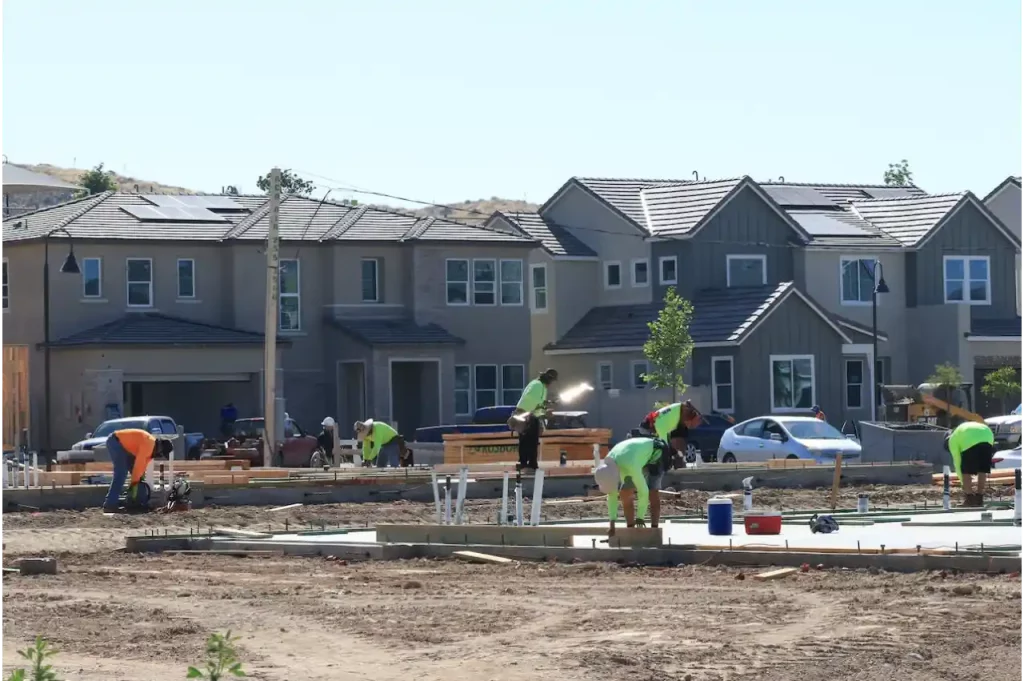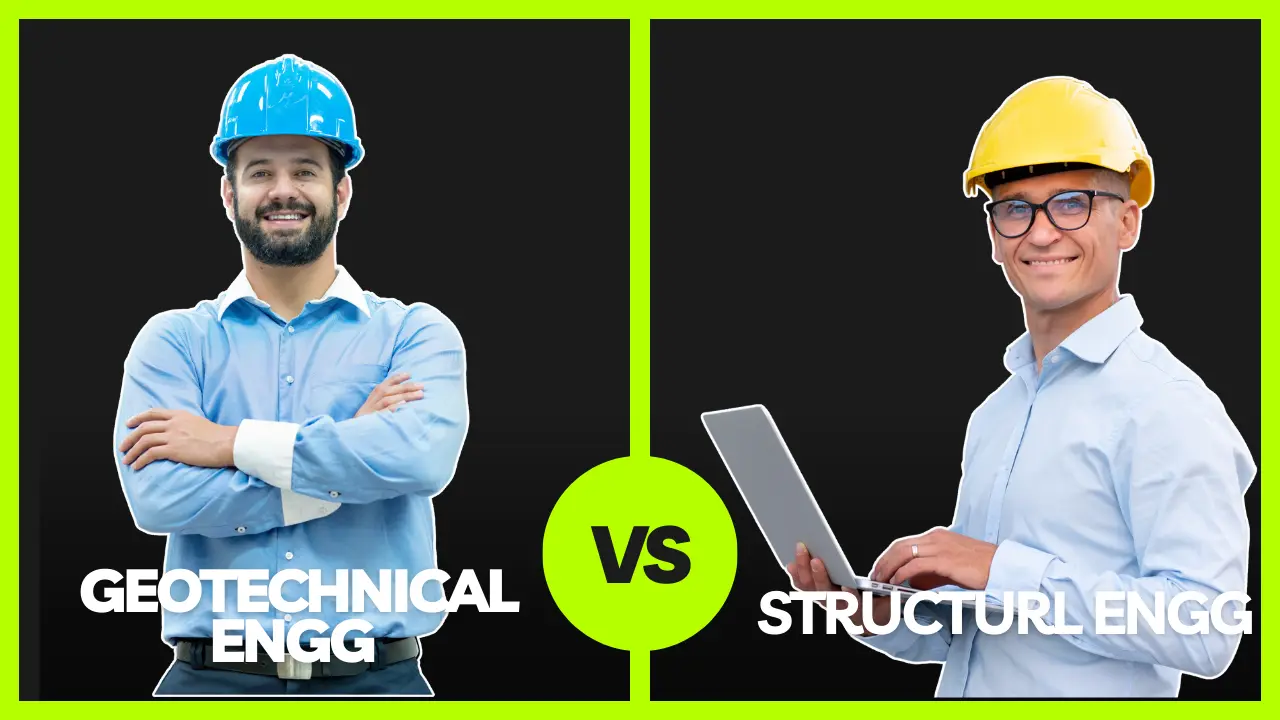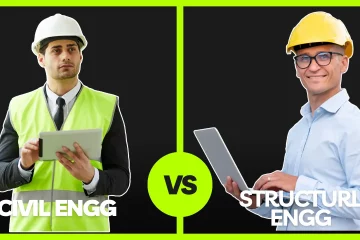In the dynamic landscape of construction, two critical players, structural engineers and geotechnical engineers, collaborate to create structures that stand the test of time.
While both professions share the common goal of ensuring the safety and stability of buildings and infrastructure, their roles, expertise, and contributions diverge, each bringing unique value to the construction process.
In this comprehensive exploration, we will delve into the intricacies of structural engineering and geotechnical engineering, unravelling the differences, examining their respective contributions, and highlighting the collaborative dynamics that drive successful construction projects.
Structural Engineers vs Geotechnical Engineers difference Explained in simple & easy way
| Aspect | Structural Engineers | Geotechnical Engineers |
|---|---|---|
| Primary Focus | Design and analysis of structures such as buildings, bridges, and dams. | Deal with soil, rock, and other geotechnical materials to understand their properties and behaviour under load. |
| Scope of Work | Concerned with the integrity, strength, and stability of buildings and infrastructure. | Focus on the properties of soil and rock, assessing their suitability for supporting structures and mitigating risks. |
| Key Responsibilities | Designing structural elements, ensuring safety, and determining load-bearing capacities. | Assessing soil composition, stability, and settlement to inform foundation design and construction recommendations. |
| Materials Involved | Work with materials like concrete, steel, and wood for structural components. | Deal with soil, rock, and other geotechnical materials to understand their properties and behavior under load. |
| Common Analysis Tools | Utilize tools such as structural analysis software and finite element analysis. | Use geotechnical engineering software, soil testing equipment, and field studies to analyze soil conditions. |
What Is The Role of a Structural Engineer?

Structural engineers are the architects of safety, translating design concepts into robust, stable structures. Their role encompasses the analysis, design, and implementation of buildings, bridges, and various other structures. Armed with a deep understanding of physics, mathematics, and material science, structural engineers ensure that structures withstand various loads and environmental factors.
1. Technical Expertise and Structural Design:
How I Would Learn Structural Engineering If I Could Start Over
At the core of a structural engineer’s responsibility lies a profound understanding of materials, structural behavior, and engineering principles. They use this expertise to create detailed designs that balance aesthetics with safety, optimizing the use of materials for maximum efficiency.
2. Collaboration with Architects:
Structural engineers collaborate closely with architects, marrying technical precision with design aesthetics. This partnership ensures that the final structure not only meets safety standards but also aligns with the architect’s creative vision. It’s a delicate balance between form and function.
You May Also Like: Best Structural Engineers Software
What is the Role of a Geotechnical Engineer:

In the subsurface realm, geotechnical engineers are the soil scientists, investigating and assessing the earth’s properties to inform construction decisions. Their role is centred on understanding the behaviour of soil and rock, providing crucial data for foundation design and mitigating geological risks.
1. Soil Investigation and Foundation Design:
Geotechnical engineers conduct thorough soil investigations, analyzing the composition, strength, and stability of the earth beneath a construction site. This data is then used to design foundations that can support the structure effectively.
2. Risk Assessment and Mitigation:
Beyond foundation design, geotechnical engineers assess geological risks such as landslides, earthquakes, or soil liquefaction. They devise strategies to mitigate these risks, ensuring the stability and safety of structures in diverse geological conditions.
Collaborative Dynamics in Construction Projects:
While structural engineers and geotechnical engineers operate in different spheres of expertise, their collaboration is crucial for the success of construction projects. The synergy between detailed structural design and informed geological data ensures a holistic construction approach.
1. Early Collaboration for Foundation Precision:
Effective collaboration begins early in the project, with geotechnical engineers providing critical data on soil conditions. This information informs the structural engineer’s design, ensuring that the foundation is precisely tailored to the earth’s properties.
2. Addressing Geological Risks for Structural Resilience:
Geotechnical engineers contribute to structural resilience by identifying and mitigating geological risks. Their insights guide the structural engineer in designing buildings that can withstand potential challenges posed by the earth beneath.
Educational Paths and Skill Sets:
Understanding the educational paths and skill sets required for each profession sheds light on the depth of knowledge and expertise that structural engineers and geotechnical engineers bring to construction projects.
1. Structural Engineering Education:
Structural engineers typically hold a bachelor’s degree in civil engineering or a related field. Their education emphasizes principles of physics, materials science, and advanced mathematics, preparing them for detailed structural analysis and design.
2. Geotechnical Engineering Education:
Geotechnical engineers often pursue degrees in civil engineering with a specialization in geotechnical engineering. Their coursework focuses on soil mechanics, foundation engineering, and geological principles, providing the expertise needed for subsurface exploration.
Technical Precision vs. Geological Understanding:
The comparison between structural engineers and geotechnical engineers centres around technical precision in design and a deep understanding of geological conditions. Both aspects are critical for creating safe and stable structures.
1. Importance of Technical Precision:
Structural engineers prioritize technical precision, ensuring that every component of a structure is designed with accuracy and efficiency. Their calculations and analyses are crucial for the safety and stability of the construction.
2. Significance of Geological Understanding:
Geotechnical engineers bring a profound understanding of the earth’s properties. Their expertise in soil mechanics and geological principles enables them to provide critical information that shapes foundation design and mitigates geological risks.
Decision-Making Processes:
The decision-making processes of structural engineers and geotechnical engineers reflect their distinct roles within construction projects, emphasizing either technical design or geological considerations.
1. Structural Engineering Decision-Making:
Structural engineers make decisions based on technical considerations, relying on their expertise in materials, physics, and structural analysis. Their decisions ensure that the construction meets safety and stability standards while adhering to architectural and design goals.
2. Geotechnical Engineering Decision-Making:
Geotechnical engineers make decisions based on geological data, conducting thorough soil investigations and risk assessments. Their decisions guide foundation design and strategies for mitigating geological risks, ensuring the stability of the structure.
Technological Advancements in Structural and Geotechnical Engineering:
Advancements in technology have significantly influenced the way both structural engineers and geotechnical engineers approach their work, enhancing efficiency, precision, and collaboration.
1. Building Information Modeling (BIM) in Structural Engineering:
BIM is a collaborative approach that allows structural engineers to create digital representations of a project, facilitating better coordination and communication among various stakeholders. BIM enhances the accuracy of design and analysis processes.
2. Advanced Soil Testing and Monitoring Technologies:
Geotechnical engineers leverage advanced technologies for soil testing and monitoring, including Cone Penetration Testing (CPT) and automated monitoring systems. These technologies enhance the accuracy of soil investigations and provide real-time data on subsurface conditions.
Career Trajectory and Advancement:
Both structural engineers and geotechnical engineers have avenues for career growth and advancement within the construction and geotechnical industries.
1. Structural Engineering Career Trajectory:
Structural engineers may advance by specializing in areas such as seismic design, forensic engineering, or project management. Leadership roles, such as becoming a chief engineer or principal, offer avenues for career growth.
2. Geotechnical Engineering Career Trajectory:
Geotechnical engineers can progress in their careers by gaining experience in diverse projects, obtaining professional licensure, and staying updated on technological advancements. Senior roles in geotechnical firms or managerial positions are common career advancements.
Salary Comparison:
The salaries of structural engineers and geotechnical engineers vary based on factors such as experience, location, industry, and project scale
1. Structural Engineer Salaries:
Salaries for structural engineers are competitive, with variations based on factors like experience and specialization. Senior roles or those with advanced expertise may command higher salaries.
2. Geotechnical Engineer Salaries:
Geotechnical engineers typically earn competitive salaries, reflecting the importance of their role in providing critical geological data for construction projects. Senior geotechnical engineers or those with specialized skills may earn higher salaries.
FAQ’s
Is a geotechnical engineer a structural engineer?
No, they have different focuses. Geotechnical engineers deal with Earth materials, while structural engineers design and analyze the structures themselves.
What is the Difference between geotechnical and civil engineering:
Geotechnical engineers focus on soil and rock behaviour, while civil engineers cover a broader range of disciplines including geotechnical, structural, transportation, and environmental engineering.
How geotechnical engineering related to structural engineering:
Geotechnical engineering provides essential information about the ground (soil, rock) to help structural engineers design stable foundations for buildings and other structures.
Can a civil engineer be a geotechnical engineer?
Yes, a civil engineer can specialize in geotechnical engineering by focusing their studies and career on understanding and working with Earth materials for construction projects.
Conclusion:
In the intricate dance of constructing the built environment, structural engineers and geotechnical engineers perform vital roles, each contributing unique skills and expertise.
While the structural engineer ensures the technical precision of designs, the geotechnical engineer unveils the secrets of the earth, providing essential data for safe and stable construction.
Their collaboration, grounded in mutual respect for their distinct roles, results in structures that not only stand tall but also harmonize with the earth beneath.
The synergy between precision in structural engineering and a deep understanding of geological conditions ensures that construction projects navigate the complexities of the ground to create lasting and resilient structures.
You May Also Like:
What Is Structural Engineering? The Definite Guide (2024)
Construction Materials for Buildings: Complete Guide (2024)
15 Best Finite Element Analysis Software (FEA) (2024)
10+ Best Tablets For Civil Engineers (2024) Top Picks Only
10+ Best Laptops For Civil Engineers & Students (2024)
15+ Best Gifts For Civil Engineers (2024) – Unique Ideas
10+ Best Tablets For Structural Engineers (2024) (Expert Advised)




